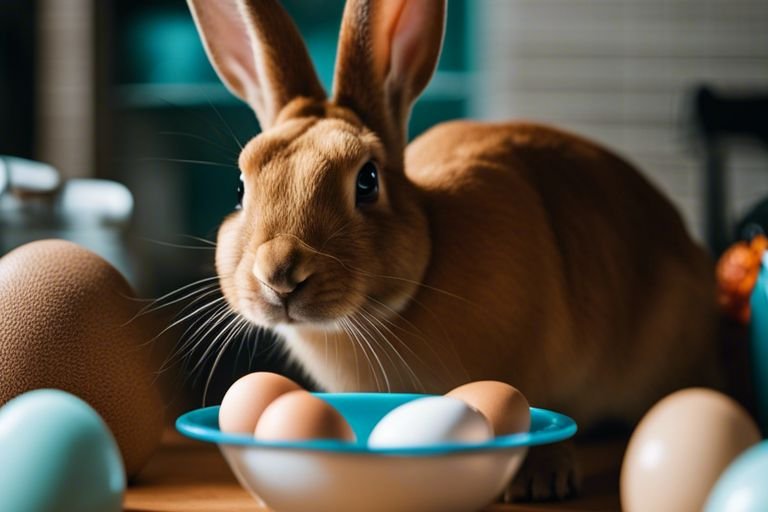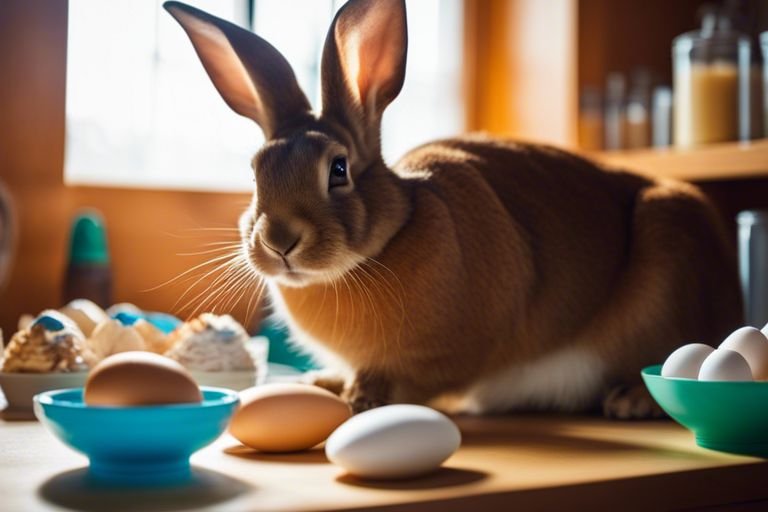Over the years, Flemish Giant rabbits have become popular pets due to their gentle nature and impressive size. As pet owners strive to provide the best possible care for their furry companions, questions about what they can and cannot eat often arise. One common question that comes up is whether Flemish Giant rabbits can eat eggs. In this article, we will research into the topic to provide you with the necessary information to make informed decisions about your rabbit’s diet.
Key Takeaways:
- Flemish Giant rabbits can eat eggs in moderation: Eggs can be a good source of protein and other nutrients for Flemish Giant rabbits, but they should be given in moderation as part of a balanced diet.
- Raw eggs should be avoided: Raw eggs can contain harmful bacteria like salmonella, so it’s best to always feed your rabbit cooked eggs to reduce the risk of foodborne illnesses.
- Eggs should be given as an occasional treat: While eggs can be a healthy addition to your rabbit’s diet, they should not replace their regular hay, pellets, and fresh vegetables which form the basis of their nutrition.
- Organic and free-range eggs are preferable: If possible, choose organic or free-range eggs for your Flemish Giant rabbit as they are typically free from hormones and antibiotics that could potentially harm your rabbit.
- Consult with a veterinarian: Before introducing eggs or any new food to your rabbit’s diet, it’s always best to consult with a veterinarian who can provide guidance on the right amounts and frequencies suitable for your individual rabbit.
Understanding Flemish Giant Rabbit Diets
Typical Dietary Requirements
It is crucial to understand the typical dietary requirements of Flemish Giant rabbits in order to ensure their health and well-being. These gentle giants require a diet that is high in fiber and low in fat to maintain their optimal health. Hay should make up the majority of their diet, providing crucial fiber that aids in digestion and prevents obesity.
Role of Protein in Rabbit Health
The role of protein in a Flemish Giant rabbit’s diet is crucial for overall health and well-being. Protein is necessary for muscle growth, repair, and maintenance, as well as for supporting the immune system. However, it is important to provide the right balance of protein, as too much can lead to health issues such as kidney damage. High-quality hay and fresh vegetables are excellent sources of protein for these large rabbits.
Rabbits have specific dietary needs that must be met to ensure their health and longevity. Understanding the importance of protein in their diet is crucial for providing them with the nutrients they need to thrive.

Eggs as a Food Source
If you are considering adding eggs to the diet of your Flemish Giants, it’s necessary to understand the implications and benefits. For more information about caring for Flemish Giants, you can visit Flemish Giants.
Nutritional Content of Eggs
To evaluate whether eggs are suitable for Flemish Giant rabbits, it is crucial to consider their nutritional content. Eggs are a rich source of protein, vitamins, and minerals, including vitamin D, which is necessary for bone health. However, eggs are also high in fats and cholesterol, so moderation is key when incorporating them into your rabbit’s diet.
Pros and Cons of Feeding Rabbits Eggs
The pros and cons of feeding rabbits eggs can help you make an informed decision about including this food source in their diet. Below is a breakdown of the advantages and disadvantages:
| Pros | Cons |
| High in protein and necessary nutrients | High in fats and cholesterol |
| Can help with muscle development | Potential for weight gain |
| Provides variety in diet | Possibility of allergic reactions |
The pros and cons of feeding rabbits eggs can help you make an informed decision about including this food source in their diet. When considering a rabbit’s diet, it’s important to weigh the benefits of added nutrients against the potential risks of excess fats and cholesterol. Moderation and balance are key to ensuring your Flemish Giants remain healthy and happy.
Rabbits are adorable yet delicate creatures that require a balanced diet to thrive. When introducing new foods like eggs into their diet, it’s crucial to monitor their response and adjust accordingly. Consult with a veterinarian or a rabbit care specialist for personalized guidance on meeting your Flemish Giant’s nutritional needs.

Safe Feeding Practices for Flemish Giant Rabbits
How to Introduce New Foods
Any new foods should be introduced to your Flemish Giant rabbit gradually. Start by offering small amounts and observe how your rabbit reacts to the new food. This will help prevent any digestive upsets that can occur from sudden diet changes.
Recommended Quantities and Frequency
Safe feeding practices for Flemish Giant rabbits include providing a balanced diet that consists mainly of hay, fresh vegetables, and a limited amount of pellets. Offer vegetables in small quantities initially and monitor your rabbit’s response. Overfeeding can lead to obesity and other health issues, so it’s important to feed in moderation.
In the matter of pellets, opt for high-quality rabbit pellets that are specifically formulated for Flemish Giant rabbits. These pellets should make up a small portion of their daily diet, with the majority of their nutrition coming from hay and fresh vegetables.
Flemish Giant rabbits should have access to fresh water at all times, and any food that is not consumed within 24 hours should be discarded to prevent spoilage.
Alternatives to Eggs
Other Protein Sources for Rabbits
To ensure your Flemish Giant rabbit gets adequate protein in its diet without relying on eggs, there are several alternative sources to consider. High-quality hay, fresh leafy greens, and commercial rabbit pellets are all excellent protein sources that can meet your rabbit’s nutritional needs. Additionally, occasional treats like small amounts of plain, unflavored tofu or cooked legumes can also provide a protein boost for your rabbit.
Balancing the Flemish Giant’s Diet
To maintain a well-balanced diet for your Flemish Giant, it’s crucial to provide a variety of fresh vegetables, high-quality hay, and a limited amount of pellets. Avoid giving sugary or high-starch foods like fruits or commercial treats, as these can lead to obesity and other health issues in rabbits. Make sure to always provide fresh, clean water, and monitor your rabbit’s weight and overall health to ensure they are thriving on their diet.
One important aspect of balancing your Flemish Giant’s diet is to avoid overfeeding certain foods, even if they are considered healthy. While hay and fresh vegetables are crucial components of a rabbit’s diet, it’s crucial to offer them in moderation to prevent gastrointestinal issues and obesity. Always consult with a veterinarian or a rabbit-savvy nutritionist to tailor a diet plan that suits your Flemish Giant’s specific needs.
Another key factor in balancing your Flemish Giant’s diet is to provide enough fiber to support their digestive health. Fiber-rich foods like hay and leafy greens not only help with digestion but also aid in preventing common health issues like hairballs and GI stasis in rabbits. Ensuring your rabbit has a consistent source of fiber in their diet is crucial for maintaining their overall well-being.
Summing up
Now that we have explored the topic of whether Flemish Giant rabbits can eat eggs, it is important to remember that eggs should not be a regular part of their diet. While eggs can provide a good source of protein and nutrients, they should only be given occasionally and in moderation to prevent any potential health issues. It is always best to consult with a veterinarian or a rabbit expert before introducing new foods into your rabbit’s diet to ensure their safety and well-being.
FAQ
Q: Can Flemish Giant Rabbits Eat Eggs?
A: No, Flemish Giant rabbits should not be fed eggs. Their diet primarily consists of hay, fresh vegetables, and a small amount of pellets. Eggs are not a natural part of their diet and can lead to digestive issues and other health problems.
Q: What should be the primary diet of Flemish Giant Rabbits?
A: The primary diet of Flemish Giant rabbits should include unlimited timothy hay, fresh vegetables such as dark leafy greens, and a small portion of rabbit pellets to ensure they receive all the necessary nutrients. It is important to provide a diet that mimics their natural eating habits for optimal health.
Q: Are there any other foods that Flemish Giant Rabbits should avoid?
A: Yes, Flemish Giant rabbits should avoid foods high in sugar, such as fruits and treats like chocolate or candy. They should also not be fed foods that are toxic to rabbits, such as avocado, rhubarb, or onions. It is important to research and provide a balanced diet to ensure the health and well-being of your Flemish Giant rabbit.
